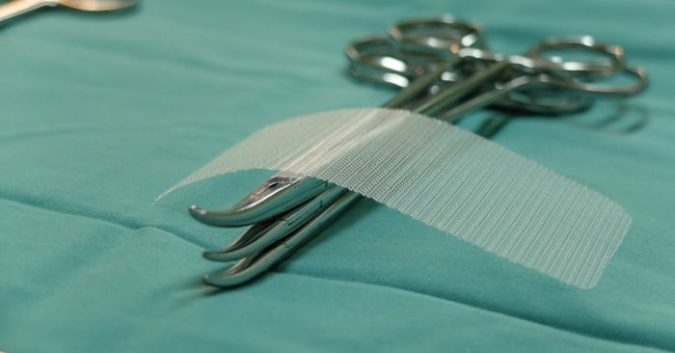Days after the FDA halted sales of pelvic mesh, a jury in Philadelphia slapped a Johnson & Johnson subsidiary with a record-setting $120 Million in damages over the defective design of their mesh implant. Instead of helping this Pennsylvania woman, the jury found the implant caused multiple nightmarish injuries, permanent damage, and required revision surgery.
The specific device in this case was the Gynecare TVT-O™ transvaginal mesh, manufactured by Ethicon Inc. The jury determined that design flaws caused the plaintiff years of suffering and terrible injuries, including:
- chronic pain
- bleeding
- vaginal scarring
- tears in her vaginal wall
- inability to have sexual intercourse
Pelvic mesh has caused thousands of gruesome injuries in women who were seeking relief from urinary stress incontinence or pelvic organ prolapse. The devices were supposed to provide support to their body, but because of faults in the Ethicon’s mesh, the product caused injuries women were never warned about.
The trial stalled in September of last year when a hung jury couldn’t agree about the device’s role in the plaintiff’s injuries. In March, a retrial began, but that too was stalled after an expert witness suffered a heart attack. In the end, the second jury found Ethicon liable for the woman’s injuries.
The award is the largest of the 7 verdicts to go against Ethicon and its parent company in the ongoing pelvic mesh lawsuits. Total damages have climbed to $270 Million. More than 100,000 women have filed claims against the company and other medical device manufacturers who did not adequately disclose the risks posed by their mesh products.
The FDA advises women with pelvic mesh implanted to maintain routine care and talk to their physician should any symptoms arise. No immediate action is necessary.
Ethicon’s Pelvic Mesh Rushed to Market Without Studies
Wednesday’s verdict consisted of $20 Million in compensatory damages and $100 Million in punitive damages. The massive verdict sends a strong message to medical device makers: do not rush a product to market without making sure it is safe.
The jury learned Ethicon put the product on the market without conducting any clinical studies to determine its safety and efficacy.
Because of an FDA loophole, most brands of pelvic mesh were approved by the FDA because they were “substantially equivalent” to devices already on the market. These devices didn’t have to undergo rigorous testing and demonstrate that they were safe and effective. Now thousands of women are paying the price.
Johnson & Johnson spokesperson Mindy Tinsley told Mass Device that “We believe the evidence showed Ethicon’s TVT-O device was properly designed and that Ethicon acted appropriately and responsibly in the research, development, and marketing of the product.”
Similar to the company’s defense of its actions in the talc-asbestos lawsuits, Johnson & Johnson believes that it can pretend away the dangerous, deadly, and very real consequences of its products.
Medical Device Safety Needs to Become a Priority
Implanting a medical device is a huge decision, and people need to be made aware of the risks. In the case of pelvic mesh, it seems like even Ethicon and Johnson & Johnson had no idea of the dangers. Rushing the product to market to cash in was more important than exercising the scientific due diligence befitting of a device that is placed around a woman’s reproductive organs.
The FDA stop order on pelvic mesh noted that the potentially debilitating product did not improve outcomes significantly compared to surgeries where mesh wasn’t used, and “native tissue” was allowed to develop instead. In retrospect, this widespread tragedy appears preventable.
Moving forward, companies that profit in the healthcare sector should take notice that the burden of proving a device’s safety and efficacy is on the company, not on the patient. No human deserves to have devices tested on them.
But it is not just medical device companies that need to change their ways.
As a critical safeguard of the public health, for America and the world, the FDA needs to act quickly on the dangers it has identified with its outdated regulatory process. With medical devices, but also with dangerous drugs and contaminated products, the agency needs to adapt in order to provide better and swifter oversight in 21st century.
The status quo is simply unacceptable. Around the world, medical devices injure an estimated 1.7 million people and are associated with 83,000 deaths each year.
Until regulators and manufacturers can work with the public to keep dangerous medical devices off the market, Sokolove Law will continue to advocate anyone who is suffering because of a product they were promised would improve their health.
All brands are trademarks of their respective companies.
